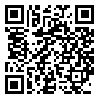1. Lucas-Carrasco R, Eser E, Hao Y, McPherson KM, Green A, Kullmann L, et al. The Quality of Care and Support (QOCS) for people with disability scale: Development and psychometric properties. Research in Developmental Disabilities. 2011; 32(3):1212-25. doi: 10.1016/j.ridd.2010.12.030 [
DOI:10.1016/j.ridd.2010.12.030]
2. Chang YJ, Chen SF, Huang JD. A Kinect-based system for physical rehabilitation: A pilot study for young adults with motor disabilities. Research in Developmental Disabilities. 2011; 32(6):2566-70. doi: 10.1016/j.ridd.2011.07.002 [
DOI:10.1016/j.ridd.2011.07.002]
3. Jones M, Marks LAB. Law and people with disabilities. In: Smelser NJ, Baltes PB, editors. International encyclopedia of the social & behavioral sciences. Berlin: Elsevier; 2005.
4. Baghaei Moghaddam G, Malekpour M, Amiri S, Mowlavi H. [The effectiveness of life skills training on anxiety, happiness and anger control of adolescence with physical-motor disability (Persian)]. Journal of Behavioral Sciences. 2012; 5(4):305-10.
5. Younesi J. Study of development of body image of physically disabled children and adolescents in relation with psychosocial adjustment [PhD thesis]. London: University of London; 1998.
6. Taleporos G, McCabe MP. Body image and physical disability--personal perspectives. Social Science & Medicine. 2002; 54(6):971-80. doi: 10.1016/s0277-9536(01)00069-7 [
DOI:10.1016/S0277-9536(01)00069-7]
7. Sahli S, Arslan U, Belgin E. Depressive emotioning in adolescents with cochlear implant and normal hearing. International Journal of Pediatric Otorhinolaryngology. 2009; 73(12):1774-9. doi: 10.1016/j.ijporl.2009.09.027 [
DOI:10.1016/j.ijporl.2009.09.027]
8. Hallahan DP, Kauffman JM, Pullen PC. Exceptional learners: An introduction to special education. London: Pearson; 2011.
9. Verhoof E, Maurice-Stam H, Heymans H, Grootenhuis M. Health-related quality of life, anxiety and depression in young adults with disability benefits due to childhood-onset somatic conditions. Child and Adolescent Psychiatry and Mental Health. 2013; 7(1):12. doi: 10.1186/1753-2000-7-12 [
DOI:10.1186/1753-2000-7-12]
10. Livneh H, Martz E, Bodner T. Psychosocial adaptation to chronic illness and disability: A preliminary study of its factorial structure. Journal of Clinical Psychology in Medical Settings. 2006; 13(3):250-60. doi: 10.1007/s10880-006-9028-5 [
DOI:10.1007/s10880-006-9028-5]
11. Kobau R, Seligman ME, Peterson C, Diener E, Zack MM, Chapman D, et al. Mental health promotion in public health: perspectives and strategies from positive psychology. American Journal of Public Health. 2011; 101(8):e1-e9. doi: 10.2105/ajph.2010.300083 [
DOI:10.2105/AJPH.2010.300083]
12. Stewart ME, Watson R, Clark A, Ebmeier KP, Deary IJ. A hierarchy of happiness? Mokken scaling analysis of the oxford happiness inventory. Personality and Individual Differences. 2010; 48(7):845–8. doi: 10.1016/j.paid.2010.02.011 [
DOI:10.1016/j.paid.2010.02.011]
13. Seligman ME, Rashid T, Parks AC. Positive psychotherapy. American Psychologist. 2006; 61(8):774-88. doi: 10.1037/0003-066x.61.8.774 [
DOI:10.1037/0003-066X.61.8.774]
14. Khodayarifard. M. [Application of positive thinking in psychotherapy with an emphasis on Islamic perspective (Persian)]. Psychology & Education. 2000; 5(1):140-64
15. Sheikhmoonesi F, Zarghami M, Khademloo M, Alimohammadi MM. [Happiness and associated demographic factors among medical students of Mazandaran University of Medical Sciences, 2010 (Persian)]. Journal of Mazandaran University of Medical Sciences. 2013; 22 (97) :132-137
16. Schneider Corey M, Corey G, Corey C. Groups: Process and practice. New York: brooks/cole; 2013.
17. Argyle M, Martin M, Crossland J. Happiness as a function of personality and social encounters. In Forgas JP, Innes J, editors. Recent advantage in social psychology: An international perspective. Amsterdam: Elsevier; 1989. [
PMCID]
18. Bayani AA. Test-retest reliability, internal consistency, and construct validity of the Farsi version of the Oxford Happiness Inventory. Psychological Reports. 2008; 103(1):139-44. doi: 10.2466/pr0.103.1.139-144 [
DOI:10.2466/pr0.103.1.139-144]
19. Alipour A, Agah-heris M. [Reliability and validity of the Oxford Happiness Inventory among Iranians (Persian)]. Journal of Iranian Psychologists. 2007; 3(12):287-98.
20. Asgharipoor N, Farid AA, Arshadi H, Sahebi A. A comparative study on the effectiveness of positive psychotherapy and group cognitive-behavioral therapy for the patients suffering from major depressive disorder. Iranian Journal of Psychiatry and Behavioral Sciences. 2012; 6(2):33-41. PMCID: PMC3940016 [
PMID] [
PMCID]
21. Senf K, Liau AK. The effects of positive interventions on happiness and depressive symptoms, with an examination of personality as a moderator. Journal of Happiness Studies. 2012; 14(2):591–612. doi: 10.1007/s10902-012-9344-4 [
DOI:10.1007/s10902-012-9344-4]
22. Ruini C, Belaise C, Brombin C, Caffo E, Fava GA. Well-being therapy in school settings: A pilot study. Psychotherapy and Psychosomatics. 2006; 75(6):331-6. doi: 10.1159/000095438 [
DOI:10.1159/000095438]
23. Wing JF, Schutte NS, Byrne B. The effect of positive writing on emotional intelligence and life satisfaction. Journal of Clinical Psychology. 2006; 62(10):1291-302. doi: 10.1002/jclp.20292 [
DOI:10.1002/jclp.20292]





